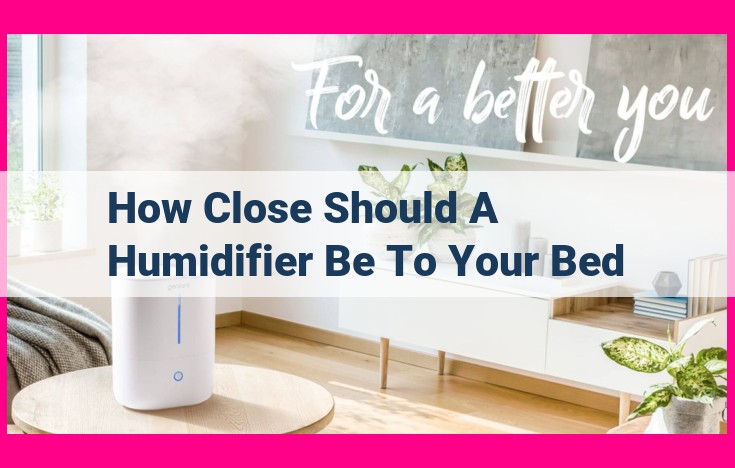Optimal Humidifier Placement For Enhanced Sleep: Distance, Type, And Precautions

When placing a humidifier near your bed, consider factors such as the size of your room and the type of humidifier you have. Ultrasonic humidifiers should be placed at least 3 feet away from your bed, while evaporative humidifiers can be placed closer. It’s important to ensure the humidifier is not directly facing your bed, as this can lead to over-humidification and congestion. Additionally, keep the humidifier clean and follow the manufacturer’s instructions to prevent mold growth and other health risks.
Choosing the Perfect Humidifier: A Comprehensive Guide for Comfort and Health
When it comes to creating a comfortable and healthy home environment, maintaining optimal humidity levels is crucial. Choosing the right humidifier can make all the difference in maximizing these benefits. Let’s delve into the key factors to consider when selecting a humidifier that best suits your needs.
Types of Humidifiers and Their Advantages
There are various types of humidifiers available, each with its own advantages.
- Evaporative humidifiers: Low maintenance, using a fan to circulate water and evaporate it into the air.
- Ultrasonic humidifiers: Quiet and efficient, using ultrasonic waves to disperse water droplets.
- Steam humidifiers: Generate warm mist, adding moisture and heat to the air.
- Impeller humidifiers: Use a spinning disk to spray water, creating a cool mist.
Determining the Right Size Humidifier
The size of the humidifier you need depends on the size of the room you want to humidify. Generally, a humidifier with a gallon capacity will cover a room of up to 250 square feet. For larger rooms, you may need a larger capacity humidifier or multiple units.
Matching Capacity to Room Size
It’s essential to match the humidifier’s capacity to the size of the room to maintain optimal humidity levels. If the humidifier is too small, it won’t be able to effectively humidify the space. Conversely, a humidifier that’s too large can lead to over-humidification, which can result in mold growth and respiratory issues.
Health Considerations
When choosing a humidifier, it’s important to consider the health of the occupants. Some humidifiers can release bacteria and mold spores into the air, which can aggravate allergies and asthma. Look for humidifiers with antibacterial and antimicrobial filters to minimize health risks.
Ideal Humidifier Usage
When it comes to using a humidifier, placement is key. For optimal performance, place the humidifier in a central location of the room, away from walls, furniture, and direct heat sources. This ensures that the humidified air circulates evenly throughout the space.
Optimal Humidity Levels
Maintaining proper humidity levels is crucial for health and comfort. The ideal humidity level for most indoor environments is between 40-60%. This range is comfortable for the human body, reducing the likelihood of respiratory issues, dry skin, and static electricity. Higher humidity levels, above 60%, can promote mold growth, while lower levels, below 40%, can lead to dry air, which can irritate the throat, nose, and skin.
Importance of Humidity Levels
Maintaining optimal humidity levels has several important benefits. It can:
- Reduce respiratory issues: Humidified air helps thin mucus, making it easier to breathe, especially for people with asthma or allergies.
- Prevent dry skin: Humid air helps moisturize the skin, reducing itching and dryness.
- Decrease static electricity: Dry air can create static electricity, which can not only be annoying but also damage electronics. Humid air discharges static electricity, creating a more comfortable environment.
- Promote better sleep: Studies have shown that optimal humidity levels can improve sleep quality, especially for those with sleep apnea or other breathing difficulties.
Health Considerations When Using Humidifiers
Humidifiers can provide much-needed relief from dry air, especially during winter months. However, it’s crucial to be aware of the potential health risks associated with their use.
Mold Growth: A Dampening Hazard
Humidifiers increase the moisture content in the air, which can create a breeding ground for mold. Mold spores thrive in damp environments, and can cause a range of health problems, including allergic reactions, respiratory infections, and asthma. To prevent mold growth, it’s essential to clean and maintain your humidifier regularly. Use distilled water, and empty and dry the unit completely when not in use.
Respiratory Issues: A Humidifier’s Dilemma
While humidifiers can alleviate dry throats and coughs, overuse can lead to respiratory problems. Excessive humidity can promote the growth of bacteria and viruses, making it harder to breathe. It can also worsen symptoms for people with existing respiratory conditions, such as asthma or bronchitis. To avoid these issues, it’s crucial to use your humidifier only when necessary.
Child Safety: Precautions to Take
Humidifiers can pose a potential safety hazard for children. The hot steam or mist from a humidifier can cause burns if it comes into contact with a child’s skin. Additionally, humidifier cords can be strangulation hazards. To ensure child safety, always keep humidifiers out of reach of children, and supervise them when they are in use.
Usage Guidelines: A Humidifier’s Safe Zone
To minimize health risks and maximize benefits, it’s important to follow these guidelines when using a humidifier:
- Choose a humidifier with a cleanable filter: This will help prevent mold and bacteria growth.
- Clean and maintain your humidifier regularly: Follow the manufacturer’s instructions to keep the unit clean and free of debris.
- Use distilled water: Using tap water can introduce minerals and bacteria into the air.
- Set the humidity level correctly: Aim for a humidity level between 30-50%. Higher humidity levels can promote mold growth and respiratory problems.
- Avoid using humidifiers in bedrooms: High humidity levels in bedrooms can lead to condensation and mold growth.
- Be aware of your personal health condition: If you have any health conditions that may be affected by humidity, consult with your doctor before using a humidifier.